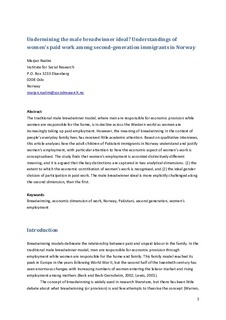Undermining the Male Breadwinner Ideal? Understandings of Women’s Paid Work among Second-Generation Immigrants in Norway
Peer reviewed, Journal article
Accepted version
Permanent lenke
http://hdl.handle.net/11250/2561247Utgivelsesdato
2016Metadata
Vis full innførselSamlinger
- Publikasjoner fra CRIStin [716]
- Tidsskriftpublikasjon [389]
Sammendrag
The traditional male breadwinner model, where men are responsible for economic provision while women are responsible for the home, is in decline across the western world as women are increasingly taking up paid employment. However, the meaning of breadwinning in the context of people’s everyday family lives has received little academic attention. Based on qualitative interviews, this article analyses how the adult children of Pakistani immigrants in Norway understand and justify women’s employment, with particular attention to how the economic aspect of women’s work is conceptualised. The study finds that women’s employment is accorded distinctively different meaning, and it is argued that the key distinctions are captured in two analytical dimensions: (1) the extent to which the economic contribution of women’s work is recognised; and (2) the ideal gender division of participation in paid work. The male breadwinner ideal is more explicitly challenged along the second dimension, than the first. Undermining the Male Breadwinner Ideal? Understandings of Women’s Paid Work among Second-Generation Immigrants in Norway
